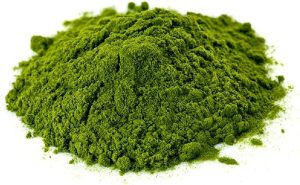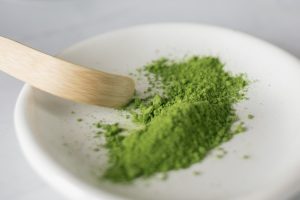
- Overview of Spirulina/Spirulina Powder
- Brief History of Spirulina/Spirulina Powder
- Functions of Spirulina/Spirulina Powder
- Recommended Daily Intake (RDI), Recommended Dietary Allowance (RDA), Adequate Intake (AI), or Reference Nutrient Intake (RNI) for Spirulina/Spirulina Powder
- Deficiency of Spirulina/Spirulina Powder
- Food Sources of Spirulina/Spirulina Powder and Where to Get It From
- Spirulina/Spirulina Powder and Its Interaction with Other Medications
- Websites and Articles to Delve into the Benefits of Spirulina/Spirulina Powder
- Disclaimer
Overview of Spirulina/Spirulina Powder
Spirulina powder is a finely ground form of the nutrient-rich cyanobacteria, Spirulina. Known for its intense green-blue color, the powder is derived from dried spirulina, a microscopic algae that thrives in alkaline freshwater.
Packed with essential nutrients, including complete proteins, vitamins, minerals, and antioxidants, spirulina powder is a popular dietary supplement. It is recognized for its potential health benefits, such as immune system support, anti-inflammatory properties, and as a source of energy. Commonly used in smoothies, juices, or added to foods, spirulina powder offers a convenient way to enhance nutritional intake, particularly for individuals following vegetarian or vegan diets.
As with any supplement, it’s essential to ensure its quality, source, and consult with healthcare professionals, especially for those with specific health concerns or allergies.
Brief History of Spirulina/Spirulina Powder
Spirulina has a rich history as a food source and dietary supplement. The use of spirulina dates back centuries, with indigenous cultures incorporating it into their diets. However, the commercial production and popularity of spirulina powder emerged in the latter half of the 20th century.
In the 1960s and 1970s, interest in spirulina grew as a potential solution to malnutrition, particularly in developing countries. The United Nations and other organizations explored its nutritional benefits due to its high protein content, essential vitamins, and minerals. Spirulina gained attention for its role in NASA’s space program, where it was considered a potential food source for astronauts.
In the late 20th century, spirulina cultivation expanded globally, with countries like Japan and the United States contributing to its commercial production. Today, spirulina powder is widely recognized as a nutrient-dense superfood and is commonly used as a supplement, offering a convenient and concentrated form of the algae’s health-promoting properties.
A brief history of Spirulina powder presented in a tabular format below:
| Time Period | Milestone |
|---|---|
| Centuries ago | Indigenous cultures incorporate Spirulina into their diets. |
| 1960s – 1970s | Growing interest in Spirulina as a potential solution to malnutrition. Consideration for space exploration. |
| Late 20th Century | Global expansion of Spirulina cultivation, with Japan and the U.S. contributing to commercial production. |
| Present | Spirulina powder widely recognized as a nutrient-dense superfood and a popular dietary supplement. |
This condensed table provides a quick overview of key milestones in the history of Spirulina powder.
Functions of Spirulina/Spirulina Powder
Spirulina and spirulina powder offer various functions and potential health benefits due to their rich nutritional composition. Here are key functions associated with spirulina:
- Nutrient Density:
- Spirulina is a nutrient-dense superfood, containing a wide range of essential nutrients, including proteins, vitamins (B-complex, iron, and more), minerals (such as calcium and magnesium), and antioxidants.
- Complete Protein Source:
- Spirulina is a source of high-quality protein, providing all essential amino acids. This makes it a valuable protein supplement, particularly for vegetarians, vegans, and individuals with limited protein sources.
- Antioxidant Properties:
- Spirulina contains various antioxidants, including phycocyanin, which can help neutralize free radicals and reduce oxidative stress, contributing to overall cellular health.
- Anti-Inflammatory Effects:
- Some studies suggest that spirulina may have anti-inflammatory properties, potentially reducing inflammation in the body.
- Immune System Support:
- Spirulina is believed to modulate immune function, promoting the activity of certain immune cells and supporting overall immune system health.
- Detoxification:
- Spirulina may aid in detoxification by binding to heavy metals and toxins, assisting in their elimination from the body.
- Energy Boost:
- The combination of B-vitamins, iron, and other nutrients in spirulina can contribute to increased energy levels and reduced fatigue.
- Cardiovascular Health:
- Spirulina has been studied for its potential to lower blood pressure and improve lipid profiles, positively impacting cardiovascular health.
- Weight Management:
- Some studies suggest that spirulina may have a role in weight management, potentially by promoting a feeling of fullness and influencing metabolic processes.
- Potential Anti-Cancer Properties:
- Preliminary research has explored the potential anti-cancer effects of spirulina, but more studies are needed to establish conclusive evidence.
- Skin Health:
- Spirulina’s antioxidant content may contribute to skin health, potentially reducing oxidative damage and supporting a healthy complexion.
It’s important to note that individual responses to spirulina can vary, and while it is generally considered safe, individuals with certain health conditions or those taking medications should consult with healthcare professionals before incorporating spirulina or spirulina powder into their diet.
Below are the functions of Spirulina/Spirulina Powder presented in a table in alphabetical order:
| Function | Description |
|---|---|
| Anti-Inflammatory Effects | Potential ability to reduce inflammation in the body. |
| Antioxidant Properties | Contains antioxidants, including phycocyanin, to neutralize free radicals and reduce oxidative stress. |
| Cardiovascular Health | Studied for potential benefits in lowering blood pressure and improving lipid profiles. |
| Complete Protein Source | High-quality protein containing all essential amino acids, beneficial for vegetarians and vegans. |
| Detoxification | May aid in the removal of heavy metals and toxins from the body. |
| Energy Boost | Nutrient combination contributes to increased energy levels and reduced fatigue. |
| Immune System Support | Believed to modulate immune function, supporting overall immune system health. |
| Nutrient Density | A nutrient-dense superfood providing essential vitamins, minerals, and antioxidants. |
| Potential Anti-Cancer Properties | Preliminary research exploring possible anti-cancer effects. |
| Skin Health | Antioxidant content may contribute to skin health, reducing oxidative damage. |
| Weight Management | Some studies suggest a role in weight management, possibly through satiation and metabolic influence. |
This table organizes the functions of Spirulina/Spirulina Powder in alphabetical order for easy reference.
Recommended Daily Intake (RDI), Recommended Dietary Allowance (RDA), Adequate Intake (AI), or Reference Nutrient Intake (RNI) for Spirulina/Spirulina Powder
As far as we are informed, there are no established Recommended Dietary Allowance (RDA), Adequate Intake (AI), or Reference Nutrient Intake (RNI) specifically for spirulina or spirulina powder. Spirulina is considered a supplement rather than a traditional nutrient with established recommended intake levels.
The appropriate dosage of spirulina can vary based on factors such as age, health status, and individual nutritional needs. It’s important to note that while spirulina is rich in nutrients, excessive intake may lead to potential side effects.
If you are considering supplementing with spirulina or spirulina powder, it is recommended to consult with a healthcare professional or a registered dietitian. They can provide personalized advice based on your health status, dietary habits, and potential interactions with medications or existing medical conditions.
Always ensure that any spirulina supplements are obtained from reputable sources to guarantee product quality and safety. Additionally, be aware that guidelines and recommendations may be updated, so it’s advisable to check with health authorities or relevant organizations for the latest information.
Deficiency of Spirulina/Spirulina Powder
Spirulina or spirulina powder itself is not a nutrient with established dietary requirements, and therefore, a deficiency in spirulina is not a recognized concept. However, spirulina is often considered a valuable dietary supplement due to its nutrient-rich composition.
It’s important to note that while spirulina can provide essential nutrients such as proteins, vitamins, and minerals, it should not be viewed as a sole source of nutrition. A well-balanced and diverse diet that includes a variety of foods from different food groups is crucial for meeting overall nutritional needs.
Deficiencies in specific nutrients typically arise from an overall lack of variety in the diet, not from the absence of a specific supplement like spirulina. Individuals should focus on obtaining nutrients from a broad range of natural sources, including fruits, vegetables, whole grains, lean proteins, and dairy or dairy alternatives.
Before incorporating any dietary supplement, including spirulina, into your routine, it’s advisable to consult with a healthcare professional or a registered dietitian. They can assess your individual nutritional needs, potential deficiencies, and provide guidance on the appropriate use of supplements in the context of your overall diet and health.
Food Sources of Spirulina/Spirulina Powder and Where to Get It From
Spirulina and spirulina powder are commonly available as supplements, and spirulina can also be found in some food products. Here are common sources of spirulina and where to obtain it:
- Spirulina Supplements:
- Spirulina is widely available in the form of dietary supplements, including capsules, tablets, and powdered forms. These supplements can be found in health food stores, pharmacies, and online retailers.
- Spirulina Powder:
- Spirulina powder can be purchased as a standalone product or included in various health food products such as smoothie mixes, protein powders, and green superfood blends. Look for these products in health food stores or online.
- Health Food Stores:
- Many health food stores carry spirulina supplements and powders. These stores specialize in natural and organic products, making them likely locations to find spirulina.
- Online Retailers:
- Spirulina supplements and powders are widely available from online retailers. Make sure to choose reputable sources to ensure product quality and safety.
- Superfood Blends:
- Spirulina is often included in superfood blends or green powders along with other nutrient-dense ingredients. These blends can be found in health food stores and online.
- Smoothie Shops:
- Some smoothie shops and juice bars may offer spirulina as an optional add-in for custom smoothies or juices.
When purchasing spirulina or spirulina-containing products, it’s essential to choose reputable brands to ensure the product’s quality, purity, and safety.
Additionally, consult with a healthcare professional before incorporating spirulina into your diet, especially if you have underlying health conditions, are pregnant, or are taking medications. Spirulina is generally safe for most people, but individual reactions can vary, and professional guidance ensures proper usage based on your specific health needs.
Spirulina/Spirulina Powder and Its Interaction with Other Medications
Spirulina and spirulina powder, being a natural dietary supplement, may interact with certain medications. It’s crucial to be aware of potential interactions and consult with a healthcare professional before adding spirulina to your routine, especially if you are taking medications or have underlying health conditions. Here are some considerations:
- Immune System Modulation:
- Spirulina may have immune-modulating effects. If you are taking immunosuppressive medications (drugs that suppress the immune system), such as corticosteroids or certain medications after organ transplantation, the immune-stimulating properties of spirulina may interfere with the intended effects of these medications.
- Blood Thinners:
- Spirulina contains vitamin K, which can affect blood clotting. Individuals taking anticoagulant or antiplatelet medications (blood thinners) should exercise caution and consult with their healthcare provider before using spirulina, as it may affect blood clotting mechanisms.
- Metabolism and Drug Absorption:
- Spirulina may influence the absorption or metabolism of certain medications. It’s advisable to take medications and spirulina at different times to minimize potential interactions. Separating the timing of medication and supplement intake can help ensure optimal absorption of both.
- Phenylketonuria (PKU):
- Individuals with phenylketonuria, a genetic disorder that affects the metabolism of the amino acid phenylalanine, should be cautious with spirulina supplements, as they may contain phenylalanine.
- Allergies:
- Some individuals may be allergic to spirulina. If you have a history of allergies, especially to seafood or other algae, exercise caution and monitor for any allergic reactions.
Always disclose your supplement use, including spirulina or spirulina powder, to your healthcare provider. This ensures they have a comprehensive understanding of your health regimen and can provide personalized advice based on your specific health conditions and medications. Individual responses to supplements can vary, and professional guidance helps manage potential risks and benefits.
Websites and Articles to Delve into the Benefits of Spirulina/Spirulina Powder
Disclaimer
The information is solely provided for educational purposes. It is not intended to diagnose, treat, cure, or prevent any disease. Seek the advice of your physician or qualified healthcare provider with any questions you may have regarding a medical condition at all times. Never disregard professional medical advice because of something you have read or learned from this article.






